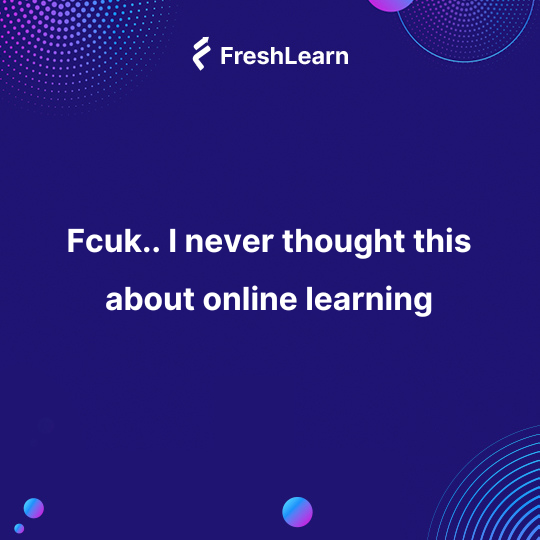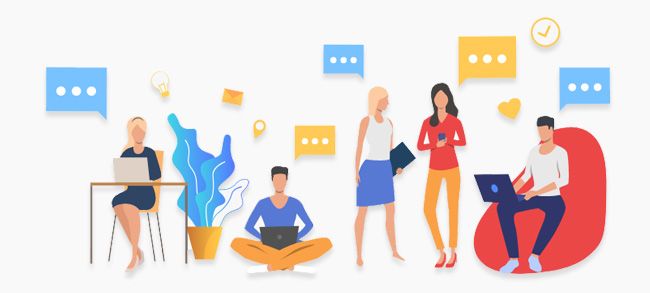
Overcoming the Myths of Online Learning: Embrace the Future of Education with Confidence
The perceived limitations of online learning are nothing but apprehensions about a new way of doing things. They’re natural, and they’re very common. | FreshLearn
Whether it was e-books, video calls, online dating, or online shopping, we have always been skeptical about digital innovations taking over traditional ways of life. But before we knew it, these things became inseparable parts of our lives and memories. Here’s why we reckon the same would happen with online learning as well.
Why do we look at online learning as a challenge?

There are quite a few legitimate reasons as to why online learning can intimidate, challenge, and put people off in the beginning. The major reasons usually are:
- The ‘personal touch, being able to see your teacher and your classmates is missing, something that feels out of place to a beginner.
- Technical glitches are common when it’s a new platform that takes up your internet bandwidth.
- Managing time, motivating yourself, scheduling study hours, and overcoming distractions at home, all on your own, take a lot of mental effort.
- Communication is vastly different when you only chat with your class and teachers or look at their faces across a screen.
- Adapting to all of these changes and the online learning experience in its entirety doesn’t come quickly to everyone and is a very subjective factor.
Take a step back, though. You are probably missing out on the numerous positives of online learning, unknowingly. Everything listed above can be psychologically explained as a negative bias. Once you look beyond it, you might realize a whole new world of possibilities.
Did you ever think about these online learning benefits?

It isn’t just the convenience of not traveling to a physical classroom or not needing to dress up for class. Online learning has a lot more to offer. Here’s how.
It’s easier to ask questions: All the introverts in the house would raise their hands at this one, especially since no one can watch them do so. In the intimidating classroom atmosphere, students who are reserved, apprehensive, or doubtful often skip their queries. In a virtual classroom, no one else has to know when you send your question to the teacher on a separate chat box.
You become an independent learner: You might not realize that the drill of planning, scheduling, or physically removing distractions from your study area, maintaining notes, etc. is actually making you a better learner. In a physical classroom, you work as per schedules, plans, and lectures that have all been organized for you. But when you study from your bedroom or a cafe, it is all up to you. The sense of discipline that these practices can inculcate would surely be helpful for not just becoming a better student, but a better professional as well.
Communication without boundaries: In a physical classroom, your social interactions are limited to teachers and students living within the vicinity of the school. In the case of online learning, you are free to learn from professors across the globe to whom you won’t have access otherwise. You also get a chance to interact with international students and learn their perspectives.
Technological learning: It’s a fact that you cannot avoid the intrusion of technology in most aspects of life. While you’re trying to learn how to set up your webcam, speakers, headsets, etc., and how to use various online learning and sharing software; you’re also picking up valuable technical skills for your professional and personal life.
Democratized education: Only a decade or two earlier, a student living across the globe would only dream of earning a scholarship and trying their luck at an Ivy League University. Today, this student can realize their dreams to some extent by taking online classes from top international universities at affordable rates, thanks to the savings on physical infrastructure.
In order to reap these and other nuanced benefits of online learning fully, you just need to keep a few starters in mind and be open to good and bad surprises.
How to make the most of online learning

New games have new rules. So hop on for an exciting new learning experience with these quick pointers.
- Always dedicate a specific time and space for your classes as well as your revisions, assignments, etc. Remove distractions such as the TV, snacks, video games, etc. of your field of view. Make a strict timetable.
- Have a few tests run with the video communication software and other tools your class is planning to use for a smoother experience. This way, you won’t lose any part of the lecture due to technical glitches.
- Have as many one-on-one interactions with your teachers as possible. Chat with them, ask them for personal video calls, and stay in touch with them for your coursework.
- Try to interact with your classmates too, and form a virtual study group that can help you stick to your schedule, understand concepts, and collaborate on assignments.
- Even if a course is from a reputed university or professor, carefully take note of the course structure to know if it’s really what you’re looking for.
- Always check the online learning platform’s policies and services before signing up for a course. These affect everything from course design to the way you interact with teachers.
- Make notes. There’s no reason not to, in any class format. Making notes increases retention and ensures that you don’t have to go through entire texts again for referring to a specific point.
- Remember that online learning does not make topics ‘easier’ or ‘harder’. The content remains the same while the manner of consumption changes. If you go in with the popular notion of an online course being ‘easy’, you might be disappointed. It would only take as much hard work as an offline course.
To conclude...
The perceived limitations of online learning are nothing but apprehensions about a new way of doing things. They’re natural, and they’re very common. But you would also notice that early adopters usually reap the best benefits of new technology. If you aren’t an early adopter, that’s alright too. The bug will catch you sooner or later, and you’ll start enjoying it. All you need is an open mind and lots of imagination.
Sounds similar to what they said when you first went to school? Bingo!
FreshLearn lets you transform your knowledge into an online school. Start creating your online courses and launch your online academy in less than 60 mins.


